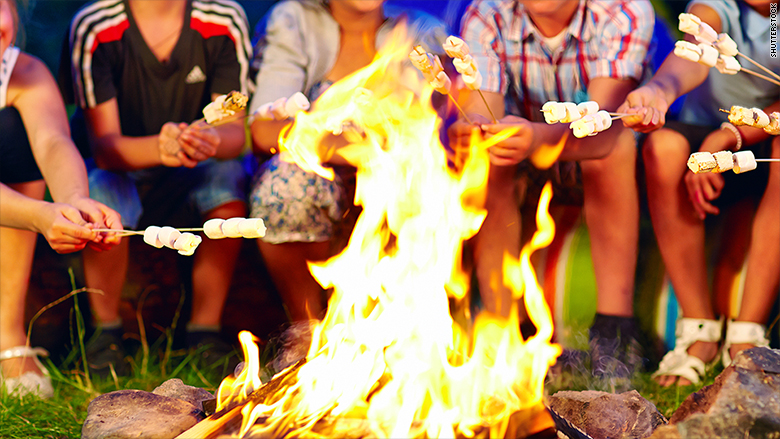
Everything You Need To Know About Camps
summer, skeeters, and s’mores!
Sometimes with camps, it’s hard to separate fact from fiction. As parents ponder what they’ll do with their children this summer, we hope this list of myths and facts about camps, compiled by camp expert Eve Eifler, will help clear up any misconceptions.
 Myth: “My son plays sports all year long, so I should give him a break from the routine.”
Myth: “My son plays sports all year long, so I should give him a break from the routine.”
Fact: While it is a nice break for some kids to fish and hike at camp, others just want to play ball! I advise parents to look for a camp that can provide the sports that the child likes, plus some new challenges. Summer sports are far different than sports during the school year; there’s less emphasis on winning. A child who can’t make the select baseball or soccer team at home may shine in a camp environment. Whether it is up to bat or on the boat, camps hire counselors who serve as role models to teach qualities like good sportsmanship, teamwork, and learning to lose gracefully.
Myth: “If I send my child to camp with a friend, it will make her more comfortable.”
Fact: What outwardly seems to provide a safety net has its pitfalls. A friend can sometimes act as a barrier to your child making new friends. In addition, your child may choose her activities based upon her friends’ interests, rather than her own. It is important to weigh the comfort of going with a friend—for instance, if the child is young and going to a specialty camp—with the possible drawbacks.
Myth: “A specialty camp–rather than a traditional camp–is the best place for my child.”
Fact: Specialty camps focus on teaching technical skills, not necessarily life skills. A child goes to this type of program to work on the skills for one sport (or for art, or for drama, etc.), rather than to be part of a community found in a traditional camp. With specialty camps, I want parents to realize that the coaches and instructors are there to teach skills, not to help your child to make a friend. Therefore, I usually recommend younger kids attend these programs with a friend.
Myth: “Camps are only for the rich.”
Fact: There is a camp out there to fit every budget. And, if you plan ahead (especially with sleep-over camps), you can take advantage of early enrollment discounts and financial aid. By applying early, it is possible to get a 20-50 percent discount off of camp tuition, based on need. Private camps tend to be more expensive, so contact camps run by your parish or agencies like the Campfire Boys and Girls, the Jewish Federation, Boys Scouts and Girl Scouts, and the Jewish Community Center. Lastly, inquire about shorter sessions and discounts for multiple children from one family.
[button color=”white” size=”normal” alignment=”center” rel=”follow” openin=”newwindow” url=”https://www.nolafamily.com/newsletter-sign-up-you-savvy-parent-you/”]Get our newsletter![/button]
 Myth: “A one-week session is the best way to ease my child into an overnight camp experience.”
Myth: “A one-week session is the best way to ease my child into an overnight camp experience.”
Fact: Sometimes it is the parent who sets a child up for an overnight camping failure by offering things like “Let’s just try this camp for one week to see how it goes.” Kids need a chance to feel homesick and get through it with the help of counselors and individual coping mechanisms to feel successful about a camp experience. A two- to four-week introductory session allows the child to be immersed in the daily routine of a new and safe place, build friendships that will carry over until the next summer, and feel the success of doing something totally on her own.
Myth: “My friends are the best source for camp suggestions.”
Fact: While your friends may speak to their own children’s experiences, camp advisory services—which are free to families—have years of experience addressing families’ specific questions and concerns. Advisors ask families the questions necessary to make sure the “fit” is right between the program and the child and provide families with list of questions to ask directors.
By asking the right questions and getting the facts about camping options, you can get the right fit for your child. Ultimately, the camp you select should provide you and your child with a lifetime of rewards.
Happy camping!
This article was contributed by Eve Eifler of “Tips on Trips and Camps,” a camp advisory service established in 1971. “Tips” provides free advice and guidance to thousands of families by phone, email and through its website, TipsonTripsandCamps.com.

